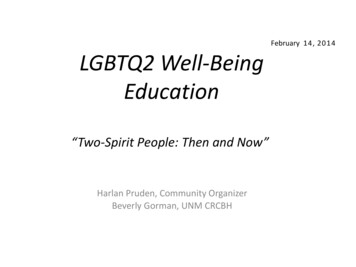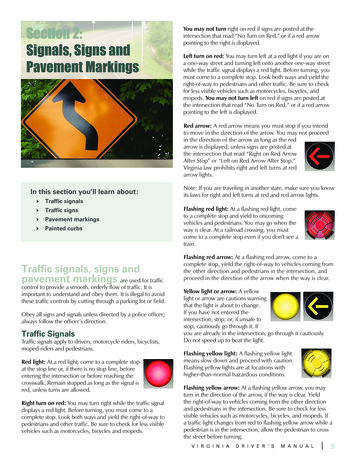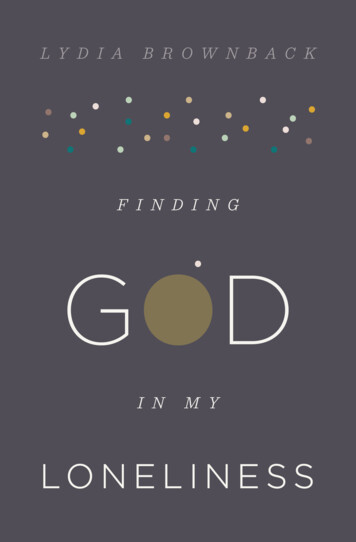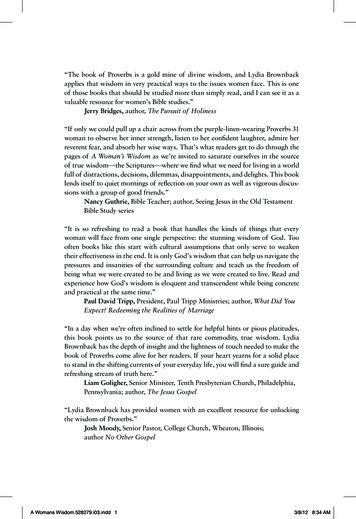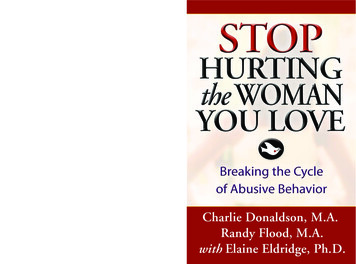
Transcription
“It takes real courage for a man to admit to himself that his lifeis not working out as he had planned . . . when a man decideshe is ready to make positive changes, he can draw on the greatinsight and compassion in these pages.”—JACKSON KATZ,creator of the award-winning educational videoTough Guise and author ofThe Macho Paradox: Why Some Men Hurt Women and How All Men Can HelpIf your relationship is rocky because of domestic abuse, this book is for you.Drawing from more than twenty-five years of working with meninvolved in abusive relationships, the authors will help you understand why you emotionally or physically hurt your partner explore what kind of man you are and want to be identify practical strategies to avoid domestic abuse develop a plan to create a more satisfying relationshipIt’s true that you can’t change another person—your partner. But you canchange your thinking and you can change your behavior, with the ultimatereward of improving your relationships, yourself, and your life.Psychologists Charlie Donaldson, M.A., and Randy Flood, M.A., arecofounders and codirectors of the Men’s Resource Centers in Holland andGrand Rapids, Michigan. Elaine Eldridge, Ph.D., is a writer and a collegeEnglish instructor.STOP HURTING theWOMAN YOU LOVESELF-HELP / PSYCHOLOGYCover design: David N Order No. 2608HAZELDEN
“It takes real courage for a man to admit to himself that his life isnot working out as he had planned, especially if he has to face thefact that he has hurt the women and children he loves.Fortunately, when a man decides he is ready to make positivechanges, he can draw on the wisdom of people like CharlieDonaldson, Randy Flood, and Elaine Eldridge, and learn fromthe numerous men whose stories they recount and discuss withgreat insight and compassion in these pages.”—JACKSON KATZ, creator of the award-winning educational videoTough Guise and author of Macho Paradox: Why Some Men HurtWomen and How All Men Can Help“There are tools on nearly every page of this important, practical,down-to-earth book. I highly recommend it to any men who wantto stop hurting the women they love and themselves. I also encouragetherapists to draw on the authors’ insights and exercises.”—JOHN LEE, author of The Flying Boy and Facing the Fire
Stop Hurting the Woman You LoveBreaking the Cycle of Abusive Behaviormenscenter.orgCharlie Donaldson, M.A., and Randy Flood, M.A.,with Elaine Eldridge, Ph.D.HAZELDEN
HazeldenCenter City, Minnesota 55012-01761-800-328-00941-651-213-4590 (Fax)www.hazelden.org 2006 by Charlie Donaldson, Randy Flood, Elaine EldridgeAll rights reserved. Published 2006Printed in the United States of AmericaNo portion of this publication may be reproduced in any mannerwithout the written permission of the publisherLibrary of Congress Cataloging-in-Publication DataDonaldson, Charlie, 1945–Stop hurting the woman you love : breaking the cycle ofabusive behavior / Charlie Donaldson and Randy Flood,with Elaine Eldridge.p. cm.Includes bibliographical references and index.ISBN-13: 978-1-59285-354-0ISBN-10: 1-59285-354-41. Family violence—United States. 2. Family violence—United States—Case studies. 3 Family violence—UnitedStates—Prevention. 4. Wife abuse—United States. 5. Wifeabuse—United States—Prevention. I. Flood, Randy, 1963–II. Eldridge, Elaine, 1951– III. Title.HV6626.2.D62 2006616.85'822—dc22200505639309 08 07 06 05 6 5 4 3 2 1Cover design by David SpohnInterior design and typesetting by Stanton Publication Services, Inc.
ContentsAcknowledgmentsPrefaceintroduction Read Me First!chapter one It Started So Wellchapter two The Time-Out: Avoiding Violence Nowviixi1511chapter three Five Lies That Ruin Lives24chapter four How Did I Get This Way?—The Trap40chapter five The Dynamics of Domestic Abuse57chapter six What Kind of Man Am I?85chapter seven Anything but Feelings112chapter eight Missing Links: Empathy and Accountability 124chapter nine Sons and Daughterschapter ten Loving Relationships133142chapter eleven Steps to Recovery161chapter twelve Roadblocks173chapter thirteen The Continuing JourneyResourcesIndexAbout the Authors182193197205
Prefacee have over twenty-five years’ combined experienceworking with men who abuse women. Often, ourmemories of the individuals—their personalities andoffenses—fade with time, but the knowledge of the harmthey’ve done stays with us.Some of the men in our groups are angry, aggressive, andantisocial. They use women carelessly and callously, andthey have little interest in establishing real relationships.Other men want their partners to be happy; they dream ofcreating stable and loving homes. They truly want to lovethe women in their lives. Yet they too hurt their partners—emotionally and physically—and in spite of their remorse,many of them are abusive and violent again and again. Ourbook is for this second group.When we work with these men, who too often sabotagetheir relationships, when we prepare workshops on domestic abuse for other therapists, and when we wrote this book,we repeatedly ask ourselves two questions: Why do thesemen abuse their partners? How can we help them to stop?We hope our answers to these questions will give men theknowledge, inspiration, and drive to stop hurting the womenthey love.During the last several years, we’ve noticed more andWxi
xiiPrefacemore books for women who’ve been abused, as well asbooks for therapists who work with men who abuse. Sincethere is no book that approaches the men themselves in aninviting but challenging manner, we have written Stop Hurting the Woman You Love. While it is aimed at men who abuse,it also includes information helpful to victims and survivorsas well as behavioral health professionals and court and lawenforcement personnel.Here are a few other things we want to point out.The people depicted in the client stories are fictional compilations, and any similarity with real persons is coincidental.This book deals solely with abusive heterosexual men. Weare certainly aware that domestic abuse is a problem amonggay and lesbian couples, but we see that as a topic for another book. In the same way, Stop Hurting the Woman YouLove isn’t designed to address men who are victims of domestic abuse. This is an important issue as well, but outsidethe scope of this particular book.We are trained in and subscribe to the Domestic AbuseIntervention Program, better known as the Duluth Model,for working with men who abuse women. The fundamentaltenet of the Duluth Model is: Safety for the victim, accountability for the abusive man. In this book, we have worked toportray the suffering of women and children at the hands ofmen who abuse, and we’ve attempted to avoid any statements or implications that would put women at risk. At thesame time, we have endeavored to address men with respect,remembering that they are human beings who can changeand be accountable for their behavior. They can stop hurting the women they love.Finally, a remark to women whose partners read thisbook. We believe that reading Stop Hurting the Woman YouLove will be helpful to many men. We hope that reading thisbook will encourage the man in your life to reduce or even
Prefacexiiieliminate his abusive behavior. However, it needs to be readin combination with treatment for domestic abuse, supportgroup meetings, and the establishment of strong relationships with accountability partners. Even with these sources ofaccountability and support, men can relapse into emotionaland physical violence. We therefore urge you to be vigilantand to take measures to increase your safety by getting information and support from your local women’s shelter.Randy FloodCharlie Donaldson
introductionRead Me First!ou’re stuck in traffic. You try to look around the truck infront of you, but you can’t see what’s holding things up.You feel the pump of adrenaline as you get more upset—you’re going to be late for work. You are already angry andupset over last night’s fight with the woman in your life.Traffic has stopped completely, but you can’t stop thethoughts racing through your mind. Why do you argue somuch? Why do you end up yelling at each other? Why can’tyou just get along? Your life seems gridlocked.The truck ahead finally inches forward. You run throughthe recent history of your relationship: the angry voices,threats, ultimatums, stony silences. Sometimes it seems as ifyou and your partner have the same argument over and over.You’re angry, but most of all you are tired.You are not always sure what happens. The argumentsseem to come out of nowhere. The night before you toldyour wife you were going to a bar with friends. You weren’tplanning on being out all night; you just wanted to relaxand have a few drinks. She wanted you to stay home andhelp your ten-year-old son with his homework. You endedup screaming at her, telling her you never get to do anything and that living with her is like a life sentence in hell.You called her a few spiteful names, and she walked out ofY1
2Stop Hurting the Woman You Lovethe room with tears in her eyes. You don’t want to talk to herthat way, but the words just spill out. You’ve grabbed andpushed her before, and you were afraid last night that youmight do it again. Or worse.You’re shocked at your own behavior, and you know youhave to do something. Much as you hate to admit it, youknow you need some help.If your relationship is rocky because of domestic abuse—and especially if you have been violent with the woman inyour life or you worry that you might be—this book is foryou. If your partner has left you because of domestic abuse,then this book will help you to avoid the behavior that causedher to leave and will help you in your next relationship.Over the course of the thirteen chapters, we will help you to understand why you emotionally orphysically hurt your partner give you down-to-earth tools to avoid domesticabuse assist you in developing a plan to create a moresatisfying and healthy relationshipYou will find a time-out plan that really works, questionsthat help you to explore what kind of man you are, and sensible techniques to improve your relationship and make youfeel better about yourself and your life.We have more than twenty-five years’ combined experience running groups for men who have abused their partners and have sometimes been violent with them. We’veworked with hundreds of men from all walks of life. Many ofthese men have been ordered by the court to attend our sessions as part of their probation agreement. On their firstday in group, they’re usually angry that they have to sit in aroom with other men once a week for six months to talk
Read Me First!3about themselves and their relationships. Many men beginby blaming their partners and minimizing their abuse. Butas the weeks pass, they begin to admit that physical abuse—whether a man has threatened his wife, pushed her, or hither hard enough to break her jaw—is serious business. Andmany of them eventually understand that they are responsible for the violence in their homes.The men in our groups also begin to recognize the destructiveness of their verbal and emotional abuse. Even whentheir behavior doesn’t lead to physical injury or divorce,their constant criticism and humiliation deeply injure theirpartners. Once a man has emotionally or physically abusedhis partner, the relationship is never the same. Abuse createsa chasm between partners. It erodes trust that may take yearsto rebuild. In a minute—even a few seconds—everythingchanges.You may be thinking, Okay, but what about her? In our workwith abusive men, we often hear them say, “Well, she hit mefirst.” We know that not all abuse is perpetrated by menagainst women. We recognize that wives and girlfriends canhurt men. But our goal is to help you take the first steps toward stopping your abusive behavior and creating a lovingand healthy relationship. This book is designed especially tohelp men like you avoid abusing their intimate partners. Youare not alone.Three requests.First, throughout this book you will find exercises andquestions to help you examine your behavior. Invest in yourself: take the time to respond carefully. You will learn important things about yourself.Second, this book is not intended to stand alone. We encourage you to participate in group or individual counselingwith a therapist who has specialized training and experiencein working with men who have abused their partners. If you
4Stop Hurting the Woman You Loveare fearful that you may injure your partner, we urge you toget professional help immediately. You can also log on toour Web site, www.menscenter.org, for further information.The “Resources” section at the end of the book lists readingmaterials and additional Web sites.Third, we ask that you read this book with courage anddetermination. If you are like many men, you are probablyangry with your partner and blame her for provoking you toabuse. Throughout this book we will continually ask you to dosomething that is difficult and sometimes painful: to changeyour focus and take a look at yourself and your behavior. Weknow from our experience working with men like you thatyou are up to the task.Although men who attend our treatment groups initiallyresist exploring their attitudes and behavior, many end upfinding the process to be worthwhile and make significantchanges in their lives. Many report that they are less abusive,argue on fewer occasions, communicate more deeply, andare happier in their relationships. Some make temporarychanges and then fall back into abusive behaviors. Othersapproach their lives with a new sense of accountability anddiligence. Most important, many of these men avoid violence.We know that you may sometimes feel like flushing thisbook down the toilet. Don’t. It will plug up your toilet, andyour life and relationships will only get worse.
chapter oneIt Started So Wellob, a quiet and soft-spoken man, seems out of place inCharlie’s domestic abuse treatment group. While mostmen blame their partners for having to attend the group,Bob has said little about Daisy’s role in landing him in courtfor domestic assault. But his story is typical in other ways.“I wanted Daisy the moment I laid eyes on her,” Bob remembers. “I don’t mean I just wanted to sleep with her, although that’s all I thought about for the first couple ofweeks. What I mean is that I wanted her to be my wife. Iwanted her in my life permanently. I was a happy man theday we married. Everything was fine for three or four years.”Bob is quiet for a moment. He shifts in his chair. Theother men in the group wait patiently; most of them knowwhat Bob will say next because they have said it themselves.“I don’t know when things started to go wrong,” Bob continues quietly. “It was just little things at first. She started getting on my nerves. When we were first married she’d usuallygo along with what I wanted. We never argued much. Butafter a while we started to disagree more and more, and Igot tired of trying to explain my point of view to her. I mean,how many times can you repeat the same thing?”Charlie asks Bob to explain one of these repetitivearguments.B5
6Stop Hurting the Woman You Love“Well, for the first two years we were married we lived inan apartment, and we always spent Thanksgiving with herfolks. That was okay with me because my family lives aboutsix hours away. But after we bought our house, she insistedon having her family—all sixteen of them—to our housefor Thanksgiving dinner. I didn’t mind having them over,but I explained over and over that I really didn’t want to beMr. Host. She wanted me to talk to her sisters’ husbands,make sure everyone had something to drink during thegame, that sort of thing. I mean, it was a holiday—all Iwanted to do was eat and watch football like everybody else.We had the same stupid argument for about three years. Italways started out as a discussion, but it always ended up inan argument.”Bob slumps in his chair. “I don’t see why she couldn’t goalong with me. It really wasn’t that important.”“Having her family over was important to Daisy,” Charliepoints out. “So what happened last November?”“There’s not much to tell. We argued again, but it was different this time. She raised her voice, and I started shouting,too. I suddenly found myself holding her by both arms, shaking her. She screamed at me to let her go. I put my handover her mouth to keep her from yelling, and all of a sudden, I realized what I was doing and let her go. She ran outto the garage, locked herself in the car, and called 911 onher cell phone.”“So here I am.”Bob’s story is not unusual. Some of his experiences maybe similar to yours. Like him, your relationship with yourwife or girlfriend probably began on a positive and happynote. Being with her was easy; she made you feel good aboutyourself. For a while, life only seemed to get better. Youthought about her all day long and couldn’t wait to see herin the evening. Sex was great. Life was good.
It Started So Well7Something HappenedBut after a while—maybe months, maybe years—somethingseemed to go wrong. You didn’t always want to do the samethings or go to the same places, and your disagreementsturned into arguments. Your disputes grew louder and morefrequent. It seemed as if she deliberately did things to irritate you. She spent hours on the phone talking to friends.She seemed more interested in the kids than in you, andsometimes she didn’t pay attention to you at all. She lost interest in sex—in fact, you hardly had any sex life at all.Your life with her deteriorated to the point that somenights you didn’t even want to go home. When you did arrivehome, there were explosive arguments. And you found yourself yelling at her, perhaps calling her names and criticizingher. You may have threatened her. And one day, like Bob,you found yourself going over the edge: you grabbed her bythe arms, or pushed her hard against the wall, or perhapsyou even hit her. Whatever you did, it scared her. She didn’ttrust you anymore. And you knew you had gone too far.You were probably shocked by your behavior. Your violence seemed sudden and uncontrollable. You felt guiltyand you promised yourself, and her, that you would neverbehave like that again. And then . . . maybe . . . you did.You knew you wanted to stop.That Something Is YouBut what happened to the good times? How did a relationship that began with love and mutual commitment disintegrate into arguing, name-calling, pushing, and hitting? Mostmen have their ups and downs, and coming home afterwork to a weed-choked lawn, too many bills, a whining toddler, and an indifferent wife might irritate any man. But you
8Stop Hurting the Woman You Loveare more than irritated. The problem you are experiencinggoes deeper than that. When things don’t go the way youthink they should, you sometimes find yourself in a suddenrage, and you want to blame her for making you angry.You may think, “Why should I have to work so hard whenshe can’t even keep the house clean? Why doesn’t she understand that Sunday is my only day off and I shouldn’t have towaste it at her mother’s for dinner? Why does she alwayscriticize my drinking when all I want is a couple of beers tocalm myself down?” If she would do what you wanted her to,you may think, the arguments would stop. If she would stopmaking you so angry, you wouldn’t find yourself on theverge of pushing or hitting her.So you tell her that you want a clean house, that you don’twant to go to her mother’s, that you have a right to drinka few beers. But she doesn’t get the message. When talkingdoesn’t work, you try raising your voice to get her attentionand make her agree with you. Maybe you shout and slamyour fist on the table. Maybe you storm around the housebut refuse to talk. You insult her, criticize her behavior, callher names, and eventually, perhaps, you grab, push, hit, orchoke her. Domestic violence is the ultimate way of lettingher know that she’d better pay attention to you.Some men think that unless they have actually hit theirpartner, they are not guilty of abuse. No one calls 911 whenthey threaten or insult or yell at their wives or girlfriends. “Ifthe police aren’t standing in my living room,” a man maythink, “how could I be accused of abuse?” But abuse takesmany forms. Domestic violence that results in a physical attack on your partner is one obvious form of abuse, but behavior that threatens, intimidates, or constantly demeansyour partner is also abusive. In fact, for many women thescars of emotional abuse often last longer than those of physical abuse.
It Started So Well9There Is HopeYou already know that to have a happy and healthy relationship, you will need to avoid emotional abuse and domesticviolence. We don’t need to tell you that. And you probablysuspect that to revive the love and happiness you once feltand to regain your partner’s trust and affection you willneed to make some major changes in your life.We want to help you with those changes, not only becauseyou may be able to salvage your present relationship oravoid torpedoing a new one, but because it is the right thingto do. Hurting our partners, physically or emotionally, isnever justifiable.“Changing your behavior” doesn’t mean turning yourselfinto a saint. The changes we’re talking about involve takingcontrol of your life so that you can be the man you want tobe. It means being the best part of you. It means learning torespect the woman in your life by seeing her as a person likeyou. You can have a loving, trusting relationship unmarredby physical or emotional abuse.You may think, “But what about her? Shouldn’t she haveto change? She could certainly stand some improvement!”It’s true that she could probably change; most of us couldimprove our behavior. But if you are serious about avoiding domestic violence and saving your relationship, the changes will needto start with you. And the truth is you can’t make her change.You can only change your own behavior. Although domesticabuse damages your partner and your relationship, healingbegins when you take responsibility for your behavior andstart on the journey of personal change.If your partner has already left you because of domesticabuse, you are faced with the probability that no amount ofchange and good behavior on your part will bring her back.A relationship that has suffered serious abuse sometimes
10Stop Hurting the Woman You Lovecannot be healed. But you probably don’t want to live alonefor the rest of your life. Sooner or later another woman willcatch your eye, and when she returns your glance, you willwant to be ready to begin a relationship without the shadowof domestic abuse. If your partner is still with you and remains committed to working on your relationship, then thesuccess of your commitment depends on your willingness towork on you.Your act of emotional or physical violence may seem tohave come out of nowhere, happening so suddenly that youcouldn’t control it. But in fact, you can learn to understandand change the attitudes and beliefs that lead to abuse. Youcan let go of trying to control her and instead control yourself. This is the work that will keep you from hurting yourpartner again.But learning how to control yourself takes time. If you areconcerned that you may be violent with your partner now,the next chapter offers short-term suggestions for avoidingdomestic violence.
chapter twoThe Time-OutAvoiding Violence Nowf you have been violent in your relationship or if you areconcerned you may be violent, you have one goal thatranks above all the rest: to avoid physically hurting yourpartner. In the long run, you’ll probably need to make somechanges to avoid emotional abuse—yelling at her or insulting, criticizing, or threatening her. But if violence threatensyour relationship right now, then avoiding physical abuse isyour top priority. It is the most important thing you can do.The purpose of the time-out is to prevent domestic violence. Some men can remain in the same room with theirpartners during an argument without becoming abusive.Others have more trouble managing their feelings and behavior, and they need to physically leave to avoid violenceand abuse.If you have been violent with your partner or are concerned that you may be, then both of you will benefit fromthe time-out technique. The time-out is intended to let youremove yourself from a potentially explosive confrontationbefore you become violent. It is not designed as a long-termsolution. Instead, the time-out is a stopgap measure devisedto give you the time you need to control your behavior.I11
12Stop Hurting the Woman You LoveViolence: The Last Step in a ProcessDomestic violence doesn’t just happen. It is supported by anunseen foundation of boyhood experiences and a man’ssense of entitlement, his belief that a woman should go alongwith what he wants. The final steps leading up to violenceoften involve a series of interactions between the two of you.That process can start when you try to persuade your partner to do something.Let’s say, for example, that you want her to agree that youshould get a new truck. She refuses, insisting that you needa new van for the family instead of a pickup. When askingdoesn’t get what you want, you start to insist, perhaps loudlyor with threats, that she agree. But she still won’t go alongwith you. Her refusal can stir up old feelings of hurt and rejection. “Why don’t I ever get what I want around here? Whyis it always the family first, regardless of what I need?” youmay think to yourself. “Why doesn’t she ever understandthat I need things, too?” At this point, the steps in the domestic violence process zip by with dizzying speed.Your hurt feelings are so uncomfortable that they barelyregister before you convert them to anger. Anger is an easier emotion to handle because it doesn’t make you feel bad,at least not at first. Anger lets you feel more in control.Anger gives you power; it lets you feel justified. So when youangrily tell her, for the last time, that you’re going to get atruck no matter what she says, you reinforce your messagewith physical violence.How can you stop yourself from getting caught in thistornado? What can you do to save your relationship ratherthan destroy it with violence? You can learn that you are notentitled to always get your way. You can become less demanding and controlling. You can learn to negotiate. Andyou can learn to be less angry.But all those changes take time . . . months, and probably years. And you don’t have that much time. In the middle
The Time-Out: Avoiding Violence Now13of an escalating confrontation, you have only a few preciousminutes in which to alter the final stages in the domestic violence process. If you’ve been working on getting along better with your partner, the gains you have made in improvingyour relationship will be lost if you hit or choke or punch orkick or push her even once more. To avoid more physicalabuse, you need something that you can do now —a selfstopping technique that will allow you to control yourselfand keep you from committing a violent act. The best thingyou can do is to get the hell out of there when you think youmight become violent. It’s like hitting the eject button before your plane crashes. If your plane is losing altitude, youneed to get out before you hit the ground. The two of you willprobably parachute to different places, but at least you won’tcrash with the airplane.Your Best DefenseTaking a time-out is like hitting that eject button. It is yourbest defense against yourself—the hurt, angry, violent you.Used properly, the time-out can prevent you from committing an act of domestic violence and can contribute to ahealthy relationship. It is a way of honoring yourself andmaintaining the safety of your partner.The time-out is not a new idea. You may even have triedit before. But you may not have used it effectively, and yourpartner may not have liked you walking out on her. In themiddle of a hot argument, you may have shouted, “Thisis ridiculous—I’m out of here!” and slammed out of thehouse. But whatever you were talking about wasn’t resolved.Your partner felt cut off and discounted, and you probablycame back pretending that nothing had happened, makingthings even worse.You may say, “Well, what if she hits me first? She needsto take the time-out!” We know that some women can be
14Stop Hurting the Woman You Loveaggressive and violent, but you are probably much strongerthan your partner is, and therefore more capable of injuring her. Even if both of you are physically aggressive, you’rethe one who is more likely to cause significant injury. So thetime-out becomes your responsibility.Finding Your Exit PointTo use the time-out properly, some preparation is needed.First, you need to identify your exit point. Second, you needto request your partner’s cooperation.The exit point is the moment at which you can still getyourself to leave to avoid hurting the woman you love. Onceyour anger has boiled beyond your control, it will be muchharder to stop yourself from completing the steps in the domestic violence process. Anger doesn’t cause violence, but itcan exaggerate your feelings of hurt or entitlement whenyour partner doesn’t behave the way you want her to.To identify your personal exit point, you need an internal anger thermometer.The scale on the thermometer below goes from 0 (freezing) to 100 (boiling). Most men call the range from 20 to 40degrees irritation: your brother-in-law who knows everythingwon’t stop talking; you need four-by-fours cut at the lumberyard and no one seems to be working there.At 60 degrees you are probably angry: you feel justified intelling off a co-worker who has taken credit for your work,even though you know it will cause trouble at your job; youbark at your wife when she tells you that you need to takecare of the kids when you’d planned to play golf.By the
other book. In the same way, Stop Hurting the Woman You Love isn't designed to address men who are victims of do-mestic abuse. This is an important issue as well, but outside the scope of this particular book. We are trained in and subscribe to the Domestic Abuse Intervention Program, better known as the Duluth Model, for working with men who .


